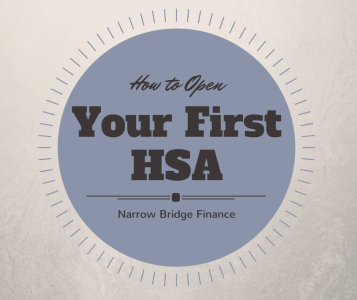When I started my new job in September, I had the option to sign up for either a Preferred Provider Organization (PPO) or High Deductible Health Plan (HDHP). I have always used a PPO in the past, so moving to an HDHP wasn’t something I was excited about. However, when I ran the numbers, I found that the way my company structured our plans the HDHP was going to be thousands of dollars less per year under almost any circumstance.
As a bonus, when signing up for a high deductible plan, I became eligible for a health savings account. An HSA is a pretty nifty way to save big on your taxes. And, it can have some pretty great uses that most of us had never thought of before.
What is a Health Savings Account?
A health savings account, most commonly just called an HSA for short, is a tax-advantaged account designed just for people with high deductible insurance plans. If you belong to an HMO, PPO, or anything that is not classified as an HDHP, you cannot get an HSA. However, there are some HMO or PPO type plans that are considered a high deductible.
For 2014, a high deductible plan has a minimum deductible of $1,250, or $2,500 for families. The maximum out-of-pocket expense under a HDHP is $6,350 for 2014, or $12,700 for families. That is increasing to $1,300 or $2,600 for families for 2015 with a maximum out-of-pocket $6,450 for individuals or $12,900 for families.
If your plan meets those requirements, you are eligible to open up a health savings account. An HSA works like an IRA for your medical expenses. Every dollar you contribute is pre-tax, and lowers your adjusted gross income for income taxes due.
 How Do the Taxes Work?
How Do the Taxes Work?
For a typical filer paying a 25% federal tax rate, you will save $25 on your taxes for each $100 you contribute to an HSA. The maximum you can contribute to an HSA in 2014 is $3,300 for individuals or $6,550 for families. If you are 55 or older, you can contribute an extra $1,000 each year. As a married guy in a state with a high income tax, I expect to save over $2,000 on my taxes this year from contributing to an HSA.
Once you contribute, the funds go into a designated health savings account that is separated from the rest of your finances. Any time you go to a doctor, fill a prescription, visit the hospital, or spend money on any qualifying expense, you can either pay directly with your HSA or reimburse yourself from your HSA funds.
The best part of an HSA is that you don’t pay taxes on contributions or expenses. This is the only account that I know of that allows completely tax free income and expenses. Most HSA administrators allow you to keep your balance either in cash like a bank account or investments like mutual funds or index funds. No matter how much your funds grow, you never pay taxes on the money as long as it goes towards a medical expense.
I spend all of the money on mile and point earning credit cards and reimburse myself for the costs from my HSA.
What Happens if I Don’t Use All of My Contributions Each Year?
The most common type of medical expense account is a flexible spending account, also known as an FSA. Through an FSA, you can contribute to an account to pay for your medical, dependent childcare, and commuting expenses pre-tax. However, with an FSA, any unspent dollars expire at the end of the year. As they say, if you don’t use it, you lose it.
With an HSA that is not the case. Any contribution that you or your employer makes into your HSA is yours for life. You don’t ever have to use the funds even on qualified medical expenses if you don’t want to. You can allow the contributions to grow into your retirement. With many people spending over a hundred thousand dollars on medical care in retirement, it isn’t a bad idea to have a big savings to pay for healthcare when you retire.
Many crafty personal finance folks have started to look at the HSA as a super-power IRA that allows tax-free earnings and investment growth into your retirement.
How Do I Choose an HSA Bank?
The big drawback of health spending accounts is the fees that many banks charge to open an HSA. A lot of the banks charge you a fee no matter what, and others waive the fee over a minimum balance.
I went with Optum Bank as it is affiliated with my health insurance company. The account has a monthly fee if my balance goes under $500, but it has been above that since the week I opened it and I have no plans to let the balance drop. As a benefit, if you have United Healthcare insurance, you can pay bills directly from this account from your insurance website.
Two other options I found with no-fee health spending accounts are North Shore Bank in Wisconsin or First American Bank in Illinois. Because the accounts are all handled online, there is no need to live in those states to open an account.
Is an HSA Right for You?
If you’ve made it this far, you know more about why a health spending account is a good thing than most people.
If you have a high deductible insurance plan, under almost all circumstances you should open an HSA and contribute as much as you are able to within the annual contribution limit. If you don’t have a high deductible plan, you can’t get an HSA. It is pretty much that simple.
If you have any questions about health spending accounts, how they work, or how you can get started, please let me know in the comments or drop me a voice question with your phone or laptop microphone. It is super easy and a fun way to get in touch!



Do I need to keep the secondary insurance plan even later when I get a job that provides another health insurance to let me keep the HSA money in the bank ?
No, once you have the money in the HSA, you can keep it there forever. If you don’t have a high deductible plan in the future, you can’t contribute anymore. But once it is in there, it is in there until you take it out.